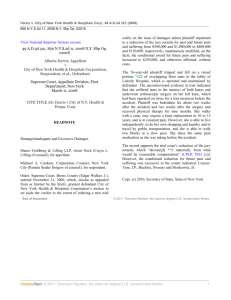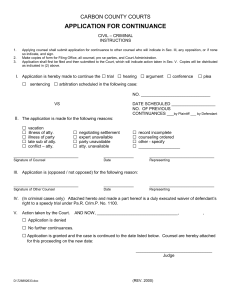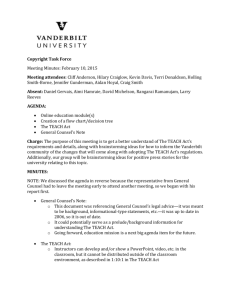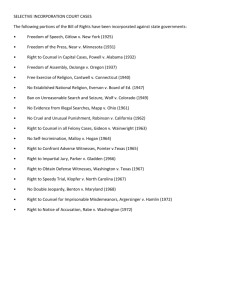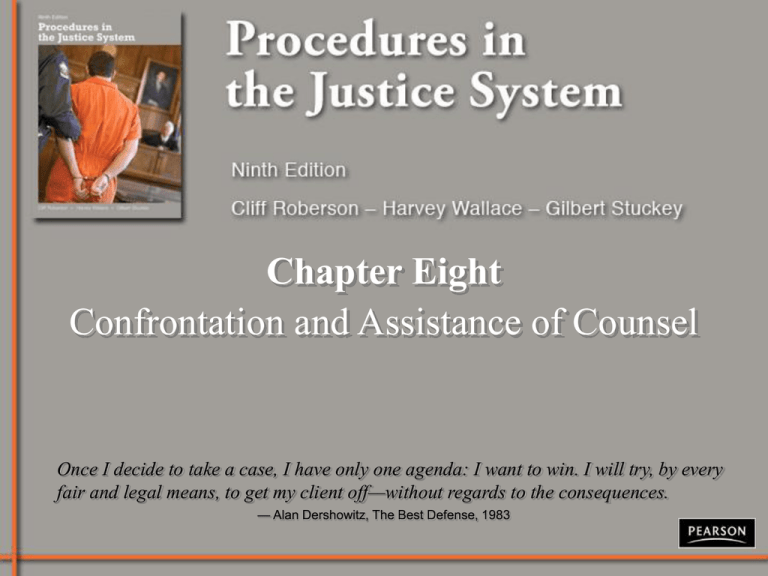
Chapter Eight
Confrontation and Assistance of Counsel
Once I decide to take a case, I have only one agenda: I want to win. I will try, by every
fair and legal means, to get my client off—without regards to the consequences.
— Alan Dershowitz, The Best Defense, 1983
KEY WORDS
Key terms to understand for this chapter…
•
•
•
•
•
•
•
•
Appointed Counsel
Bench Warrant
Conviction in Absentia
Effective Counsel
Farce or Sham Test
Indigent Defendant
Public Defender
Retained Counsel
Procedures in the Justice System, Ninth Edition
By Cliff Roberson, Harvey Wallace, and Gilbert Stuckey
• Right of Confrontation
• Self-Representation
• Standby Counsel
© 2010 Pearson Higher Education, Inc.
Pearson Prentice Hall - Upper Saddle River, NJ 07458
OBJECTIVES
After completing this chapter, you should be able to…
• Describe the defendant's right to be present at trial.
• Explain the defendant's right to counsel.
• Discuss when the state has an obligation to provide
defendant with a counsel.
• List the duties of a defense counsel.
• Distinguish between appointed counsel and retained
counsel.
Procedures in the Justice System, Ninth Edition
By Cliff Roberson, Harvey Wallace, and Gilbert Stuckey
© 2010 Pearson Higher Education, Inc.
Pearson Prentice Hall - Upper Saddle River, NJ 07458
OBJECTIVES
(cont.)
After completing this chapter, you should be able to…
• Explain the right of self-representation.
• Discuss the functions of a standby counsel.
• Explain the test for effective assistance of counsel.
Procedures in the Justice System, Ninth Edition
By Cliff Roberson, Harvey Wallace, and Gilbert Stuckey
© 2010 Pearson Higher Education, Inc.
Pearson Prentice Hall - Upper Saddle River, NJ 07458
Presence of the Defendant at a Trial
• In some countries, an accused person may be tried and
convicted of a crime without being present and without
knowing that a trial has taken place.
– referred to as conviction in absentia
• To prevent such in the US, the Sixth Amendment of the
Constitution, and laws of all states, include a provision
that guarantees that witnesses must appear in person in
court to present their facts, and gives the defendant the
right to be present during every phase of trial
proceedings.
Procedures in the Justice System, Ninth Edition
By Cliff Roberson, Harvey Wallace, and Gilbert Stuckey
© 2010 Pearson Higher Education, Inc.
Pearson Prentice Hall - Upper Saddle River, NJ 07458
Presence of the Defendant at a Trial
• For many years, interpretation of the accused’s right to
be present was so rigid that, if the defendant was not
present, trial had to be halted until he/she was in court.
• Defendants occasionally took advantage of this by
being so disruptive the trial could not continue with
their presence or by failing to appear in court.
– thus preventing the trial from taking place
• As time passed, some courts relaxed the rule requiring
defendant presence when he/she was voluntarily absent.
Procedures in the Justice System, Ninth Edition
By Cliff Roberson, Harvey Wallace, and Gilbert Stuckey
© 2010 Pearson Higher Education, Inc.
Pearson Prentice Hall - Upper Saddle River, NJ 07458
Presence of the Defendant at a Trial
• The Supreme Court in Estelle v. Williams, stated, with
few exceptions, an accused shouldn’t be compelled to
go to trial in jail clothing and/or restraints.
– because of possible impairment of his/her presumption
of innocence, which is basic to the adversary system
Attorney Meets with Young Law Offender.
Procedures in the Justice System, Ninth Edition
By Cliff Roberson, Harvey Wallace, and Gilbert Stuckey
© 2010 Pearson Higher Education, Inc.
Pearson Prentice Hall - Upper Saddle River, NJ 07458
Presence of the Defendant at a Trial
Disruption of the Trial - Illinois v. Allen
• A separate issue is raised when a defendant is present,
demands to remain present but becomes so disruptive
that the trial cannot take place.
Justice Potter Stewart (1915–1985), associate justice of the U.S.
Supreme Court, appointed by President Dwight D. Eisenhower in 1958.
On the Court, where he served until his retirement
in 1981, Stewart was generally regarded as a strict constructionist.
Procedures in the Justice System, Ninth Edition
By Cliff Roberson, Harvey Wallace, and Gilbert Stuckey
© 2010 Pearson Higher Education, Inc.
Pearson Prentice Hall - Upper Saddle River, NJ 07458
Presence of the Defendant at a Trial
Disruption of the Trial - Illinois v. Allen
• In Illinois v. Allen, the Supreme Court held that a
defendant waived right to be present at trial by his
disruptive action, stating the Sixth Amendment
guarantee of confrontation could be…
– “lost by consent or at times even by misconduct.”
– Once lost, the right to be present can, of course, be
reclaimed as soon as the defendant is willing to conduct
himself consistently with the decorum and respect.”
Procedures in the Justice System, Ninth Edition
By Cliff Roberson, Harvey Wallace, and Gilbert Stuckey
© 2010 Pearson Higher Education, Inc.
Pearson Prentice Hall - Upper Saddle River, NJ 07458
Presence of the Defendant at a Trial
Disruption of the Trial - Illinois v. Allen
• The Court further stated:
– “…we explicitly hold today that a defendant can lose his
right to be present at trial if, after he had been warned by the
judge that he will be removed if he continues his disruptive
behavior, he nevertheless insists on conducting himself in a
manner so disorderly, disruptive, and disrespectful of the
court that his trial cannot be carried on with him in the
courtroom.”
Procedures in the Justice System, Ninth Edition
By Cliff Roberson, Harvey Wallace, and Gilbert Stuckey
© 2010 Pearson Higher Education, Inc.
Pearson Prentice Hall - Upper Saddle River, NJ 07458
Presence of the Defendant at a Trial
Voluntary Absence from Trial
• Allen definitely established that trial could take place in
absence of a defendant when he/she was so disruptive
that removal from the courtroom became necessary.
– this decision also provided that a defendant who voluntarily
absented him/her self waived all right to be present
• Even before Allen, courts were beginning to accept that
if a defendant was voluntarily absent, the trial could
proceed in his/her absence.
• This viewpoint was expressed in Cureton v. US.
Procedures in the Justice System, Ninth Edition
By Cliff Roberson, Harvey Wallace, and Gilbert Stuckey
© 2010 Pearson Higher Education, Inc.
Pearson Prentice Hall - Upper Saddle River, NJ 07458
Presence of the Defendant at a Trial
Voluntary Absence from Trial - Cureton
• The Court concluded in Cureton:
– “if a defendant at liberty remains away during his trial the
court may proceed provided it is clearly established that his
absence is voluntary.
– “He must be aware of the processes taking place, of his right
and of his obligation to be present, and he must have no
sound reason for remaining away.”
• This is sometimes referred to as the Cureton test.
– the defendant must have “knowingly and voluntarily
absented himself.”
Procedures in the Justice System, Ninth Edition
By Cliff Roberson, Harvey Wallace, and Gilbert Stuckey
© 2010 Pearson Higher Education, Inc.
Pearson Prentice Hall - Upper Saddle River, NJ 07458
Presence of the Defendant at a Trial
Voluntary Absence from Trial
• As a result of Allen and Cureton, many states have
passed provisions similar to the Federal Rules of
Criminal Procedure, which provides:
– “in prosecutions for offenses, not punishable by death,
the defendant’s voluntary absence after the trial has
been commenced in his presence shall not prevent
continuing the trial to & including the return of the verdict.”
• The federal rule, as well as provisions of many states,
holds that trial may continue in the absence of the
defendant if trial was commenced in his/her presence.
Procedures in the Justice System, Ninth Edition
By Cliff Roberson, Harvey Wallace, and Gilbert Stuckey
© 2010 Pearson Higher Education, Inc.
Pearson Prentice Hall - Upper Saddle River, NJ 07458
Presence of the Defendant at a Trial
Voluntary Absence from Trial
• Under these circumstances, the trial cannot commence
unless the defendant is present.
– a defendant out on bail could keep trial from taking place
merely by not showing up
• To overcome this, several states have provisions stating
trial may commence when the defendant, knowing that
the case is set for trial, voluntarily fails to appear.
• It must be established the trial actually began while
the defendant was present.
– jury trial begins once the jury is sworn; court trial when the
first witness is sworn
Procedures in the Justice System, Ninth Edition
By Cliff Roberson, Harvey Wallace, and Gilbert Stuckey
© 2010 Pearson Higher Education, Inc.
Pearson Prentice Hall - Upper Saddle River, NJ 07458
Presence of the Defendant at a Trial
Voluntary Absence from Trial
• The problem is establishing the defendant knowingly
and voluntarily absented him/ herself from the trial.
– this could take time, and the judge would have to delay
progress of the trial until this could be determined
• If the court can’t determine knowing, voluntary
absence, the judge must declare a mistrial.
– or delay the present trial until the defendant can be located
and arrested on a bench warrant
• If it cannot be determined the defendant was absent
without cause & conviction results, a new trial must be
granted unless satisfactory reason for absence is given.
Procedures in the Justice System, Ninth Edition
By Cliff Roberson, Harvey Wallace, and Gilbert Stuckey
© 2010 Pearson Higher Education, Inc.
Pearson Prentice Hall - Upper Saddle River, NJ 07458
Right to Counsel
• Under the common law of England, a person on trial
for a felony was not entitled to assistance of counsel.
– if a misdemeanor the defendant had the right of counsel
• Denial of assistance of counsel in felony cases was
rejected by the colonists, and in most colonies right
of counsel became a part of their due process of law.
• For many generations, right to counsel was interpreted
as meaning if an accused appeared with an attorney, the
accused could not be denied assistance of the attorney.
– however, if defendants were unable to afford an attorney
to assist their defense, it was their misfortune
Procedures in the Justice System, Ninth Edition
By Cliff Roberson, Harvey Wallace, and Gilbert Stuckey
© 2010 Pearson Higher Education, Inc.
Pearson Prentice Hall - Upper Saddle River, NJ 07458
Right to Counsel
Providing Counsel - Powell v. Alabama
• One of the earliest decisions in which the US Supreme
Court held that in certain instances an accused must be
provided with an attorney, if he/she cannot afford one,
was the case of Powell v. Alabama.
• Facts indicate that ignorant & friendless black youths,
strangers in the community, without means to obtain
counsel, were hurried to trial in an Alabama state court
for a capital offense without appointment of counsel.
– the youths were convicted, and their case taken to the US
Supreme Court on grounds the defendants had been denied
due process of law
Procedures in the Justice System, Ninth Edition
By Cliff Roberson, Harvey Wallace, and Gilbert Stuckey
© 2010 Pearson Higher Education, Inc.
Pearson Prentice Hall - Upper Saddle River, NJ 07458
Right to Counsel
Providing Counsel - Powell v. Alabama
• The Court agreed that the defendants had been denied
due process of law in that they had not been provided
with counsel to assist them in their defense.
• The Court stated:
– “All that is necessary now to decide, as we do decide, is that
in a capital case, where the defendant is unable to employ
counsel, and is incapable adequately of making his own
defense because of ignorance, feeblemindedness, illiteracy,
or the like, it is the duty of the court, whether requested or
not, to assign counsel for him as a necessary requisite of
due process of law.”
Procedures in the Justice System, Ninth Edition
By Cliff Roberson, Harvey Wallace, and Gilbert Stuckey
© 2010 Pearson Higher Education, Inc.
Pearson Prentice Hall - Upper Saddle River, NJ 07458
Right to Counsel
Gideon v. Wainwright
• The Court held in capital offenses, the judge must
appoint an attorney when the accused is unable to
obtain counsel.
• This decision remained in effect until
Gideon v. Wainwright, when the Court
held counsel must be provided for any
defendant irrespective of charge.
U.S. Supreme Court Justice Ruth Bader Ginsburg, appointed by President
Bill Clinton and considered to be one of the Court’s most liberal justices.
Justice Ginsburg spent thirteen years as a federal judge, prior to which,
she was a counsel for the National Organization for Women (NOW).
Procedures in the Justice System, Ninth Edition
By Cliff Roberson, Harvey Wallace, and Gilbert Stuckey
© 2010 Pearson Higher Education, Inc.
Pearson Prentice Hall - Upper Saddle River, NJ 07458
Right to Counsel
Right to Counsel in Petty Cases
• There remained question of whether counsel must be
appointed for one brought to trial on a petty charge.
• In Argersinger v. Hamlin, the Court held that no person
may be imprisoned for offense without counsel:
– “The Sixth Amendment …provides specified standards for
all criminal prosecutions.”
– “The requirement of counsel may well be necessary for a fair
trial even in a petty offense prosecution.”
– “…no person may be imprisoned for any offense, …petty,
misdemeanor, or felony, unless he was represented by
counsel”
Procedures in the Justice System, Ninth Edition
By Cliff Roberson, Harvey Wallace, and Gilbert Stuckey
© 2010 Pearson Higher Education, Inc.
Pearson Prentice Hall - Upper Saddle River, NJ 07458
Right to Counsel
Waiver of Counsel - Faretta v. California
• In Adams v. US, the Supreme Court held a capable
defendant could waive right to counsel.
– it must be determined first the accused is capable of defense
without counsel’s assistance
• Carried further in Faretta v. California, the Court held
that when a defendant waives counsel, he/she has the
constitutional right to self-representation, stating:
– “…in order to represent himself, the accused must
“knowingly and intelligently” forego those …benefits”
– “his choice must be honored out of that respect for the
individual which is the lifeblood of the law.”
Procedures in the Justice System, Ninth Edition
By Cliff Roberson, Harvey Wallace, and Gilbert Stuckey
© 2010 Pearson Higher Education, Inc.
Pearson Prentice Hall - Upper Saddle River, NJ 07458
Right to Counsel
Knowing and Intelligent Waiver - Faretta
• The phrase “knowingly and intelligently” placed a
serious burden on trial judges.
– of determining if a defendant was capable of “knowingly
& intelligently” waiving counsel, and of self-representation
• If a trial judge concludes a defendant is capable of selfrepresentation, on conviction, then he/she may appeal.
– an appellate court may hold the defendant was not capable
of making an intelligent waiver of the right to counsel
• If the judge concludes the defendant was incapable…
– the appellate court may decide the defendant was denied the
right of self-representation
Procedures in the Justice System, Ninth Edition
By Cliff Roberson, Harvey Wallace, and Gilbert Stuckey
© 2010 Pearson Higher Education, Inc.
Pearson Prentice Hall - Upper Saddle River, NJ 07458
Right to Counsel
Knowing and Intelligent Waiver - Faretta
• When an accused requests self-representation, it is
usually necessary for the judge to hold a hearing to
determine capability of the accused to make the waiver.
– referred to as a Faretta hearing
• The time required to conduct this hearing varies with
the each case, and appellate courts have held:
– “perfunctory hearing is improper. The record must show
that the defendant made a knowing and intelligent election”
• Dissenting justices in Faretta case believed majority
justices had read into the Sixth Amendment something
not intended by its framers.
Procedures in the Justice System, Ninth Edition
By Cliff Roberson, Harvey Wallace, and Gilbert Stuckey
© 2010 Pearson Higher Education, Inc.
Pearson Prentice Hall - Upper Saddle River, NJ 07458
Right to Counsel
Standby Counsel - McKaskle v. Wiggins
• The majority justices in Faretta case did indicate a trial
judge, over objections of the defendant, could appoint a
standby counsel to aid the defendant.
• McKaskle v. Wiggins, reaffirmed Faretta:
– “…self-representation is not a license to abuse the dignity
of the courtroom.”
– “A defendant’s …rights are not violated when a trial judge
appoints standby counsel …over the defendant’s objection”
– “…to assist the defendant in overcoming routine obstacles
that stand in the way of the defendant’s achievement of his
own clearly indicated goals”
Procedures in the Justice System, Ninth Edition
By Cliff Roberson, Harvey Wallace, and Gilbert Stuckey
© 2010 Pearson Higher Education, Inc.
Pearson Prentice Hall - Upper Saddle River, NJ 07458
Right to Counsel
Why Choose Self-Representation?
• With the advantages in having assistance of counsel,
and disadvantages of self-representation, why a
defendant would insist upon self-representation?
• Many defendants either do not trust attorneys or
question their capabilities; some feel attorneys do not
have their client’s best interests at stake or are in
collusion with the prosecuting attorney.
– others receive certain gratification from self-representation
• A defendant who represents him/herself is referred toas
“appearing in propria persona” (“in one’s own proper
person”), or in person.
Procedures in the Justice System, Ninth Edition
By Cliff Roberson, Harvey Wallace, and Gilbert Stuckey
© 2010 Pearson Higher Education, Inc.
Pearson Prentice Hall - Upper Saddle River, NJ 07458
Right to Counsel
When Right to Counsel Begins
• For many years, the Sixth Amendment guarantee to the
assistance of counsel was interpreted as meaning
assistance at the time of trial.
• It was generally accepted that counsel need not be
provided for the indigent defendant until the trial.
• Later US Supreme Court decisions established a new
interpretation of when the right to counsel began and
when counsel had to be provided for the indigent
defendant.
Procedures in the Justice System, Ninth Edition
By Cliff Roberson, Harvey Wallace, and Gilbert Stuckey
© 2010 Pearson Higher Education, Inc.
Pearson Prentice Hall - Upper Saddle River, NJ 07458
Right to Counsel
When Right to Counsel Begins
• In Escobedo v. Illinois, the US Supreme Court held that
the right to the assistance of counsel begins long before
the time of the trial, at times, even
before an arrest is made.
• The Court stated that when an
investigation shifts from“…from
investigatory to accusatory,”
the accused is entitled to counsel.
Supreme Court Associate Justice Clarence Thomas stands behind
former Justice Sandra Day O’Connor during a formal portrait at the
Supreme Court.
Procedures in the Justice System, Ninth Edition
By Cliff Roberson, Harvey Wallace, and Gilbert Stuckey
© 2010 Pearson Higher Education, Inc.
Pearson Prentice Hall - Upper Saddle River, NJ 07458
Right to Counsel
When Right to Counsel Begins
• Escobedo provided once suspicion is focused upon a
particular suspect, he/she is entitled an attorney.
– nothing was said about having to furnish an attorney
• In Miranda, as stated, the Court held an accused must
be advised of the right to the assistance of counsel.
• Although Escobedo and Miranda are more closely
related to evidence and admissibility of confessions
than procedure, these decisions emphasized the
importance of the assistance of counsel
– and set guidelines on when that right to assistance begins
Procedures in the Justice System, Ninth Edition
By Cliff Roberson, Harvey Wallace, and Gilbert Stuckey
© 2010 Pearson Higher Education, Inc.
Pearson Prentice Hall - Upper Saddle River, NJ 07458
Right to Counsel
Effective Counsel
• A defendant is entitled to effective counsel.
– who has knowledge of defendant rights and capable of
presenting defenses to which the accused is entitled
• If counsel does not effectively represent a defendant, a
conviction could be overruled upon appeal.
– because of the denial of assistance of counsel
• When found ineffective, attorneys are frequently
sanctioned by the state bar association.
– a powerful incentive to diligently represent a client
Procedures in the Justice System, Ninth Edition
By Cliff Roberson, Harvey Wallace, and Gilbert Stuckey
© 2010 Pearson Higher Education, Inc.
Pearson Prentice Hall - Upper Saddle River, NJ 07458
Right to Counsel
Effective Counsel - Farce or Sham Test
• Appellate courts have stated it must appear that lack of
diligence/competence reduced trial to a farce or sham.
– today’s courts have adopted a less stringent criterion for
determining the competency of counsel
• Counsel is considered ineffective if it fails to meet the
standard of competence expected of criminal attorneys.
• Effective counsel has the duty to investigate carefully
all defenses of fact and law of a case.
– if failure to do so results in the failure to present a crucial
defense during the trial, the defendant has been denied
proper counsel, and a conviction may be reversed
Procedures in the Justice System, Ninth Edition
By Cliff Roberson, Harvey Wallace, and Gilbert Stuckey
© 2010 Pearson Higher Education, Inc.
Pearson Prentice Hall - Upper Saddle River, NJ 07458
Right to Counsel
Crucial Error by Counsel
• Effectiveness is usually considered when the court
appoints an for a defendant who cannot afford one.
• It is accepted that whether an attorney is appointed or is
one of the defendant’s own choosing, competence will
be measured by the same degree.
• Stated by the Court in Strickland v. Washington:
– “An accused is entitled to be assisted by an attorney, …who
plays the role necessary to ensure that the trial is fair.”
– “A defendant may not expect an error-free attorney, but if
an error is crucial to the defense, effective counsel has
been denied.”
Procedures in the Justice System, Ninth Edition
By Cliff Roberson, Harvey Wallace, and Gilbert Stuckey
© 2010 Pearson Higher Education, Inc.
Pearson Prentice Hall - Upper Saddle River, NJ 07458
Right to Counsel
Crucial Error by Counsel
• Determining whether an error was crucial has been a
major problem for appellate courts, since no guidelines
were set to measure the effectiveness.
• In Strickland, the Court endeavored to correct this by
providing criteria to measure effectiveness:
– “…the defendant must show that counsel’s representation
fell below an objective standard of reasonableness.
– “More specific guidelines are not appropriate.”
• Strickland decision points out that burden of proving
ineffective assistance of counsel is on the defendant.
Procedures in the Justice System, Ninth Edition
By Cliff Roberson, Harvey Wallace, and Gilbert Stuckey
© 2010 Pearson Higher Education, Inc.
Pearson Prentice Hall - Upper Saddle River, NJ 07458
Right to Counsel
Public Defender and Appointed Counsel
• If the accused is not in a position to employ private
counsel, the court must appoint effective counsel.
– if not be readily obtained, all prosecutive action must suspend
• To overcome this, many counties have established the
public defender, whose function is representing those
defendants who cannot afford an attorney of their own.
• like the prosecuting attorney, paid out of public funds
• Many do not understand use of public funds to employ
a prosecutor, and, at the same time, to pay a public
defender.
Procedures in the Justice System, Ninth Edition
By Cliff Roberson, Harvey Wallace, and Gilbert Stuckey
© 2010 Pearson Higher Education, Inc.
Pearson Prentice Hall - Upper Saddle River, NJ 07458
Right to Counsel
Public Defender and Appointed Counsel
• Before an accused may have an appointed attorney, it
must be established the defendant is an indigent person.
• About 85% of those arrested on felony charges are
without question unable to afford an attorney
– determining which others can afford an attorney is difficult
• Some courts have held if the defendant can post bail,
he/she is not indigent; others that counsel is to be
provided for any defendant who is unable to obtain
counsel without serious financial hardship.
– that friends or relatives have posted bail is not sufficient
grounds for denying the defendant free counsel
Procedures in the Justice System, Ninth Edition
By Cliff Roberson, Harvey Wallace, and Gilbert Stuckey
© 2010 Pearson Higher Education, Inc.
Pearson Prentice Hall - Upper Saddle River, NJ 07458
Right to Counsel
Public Defender and Appointed Counsel
• Another test is if a private attorney would represent the
defendant in his/her present economic circumstances.
• Judges who doubt the indigency status of a defendant
have required the defendant to file a
financial statement under oath.
Justice Stephen G. Breyer, appointed in 1994 by President Bill Clinton.
Known for his pragmatic approach to constitutional law, Breyer is
generally associated with the more liberal side of the Court.
Following a clerkship with Supreme Court Associate Justice Arthur
Goldberg in 1964, Breyer became well-known as a law professor and
lecturer at Harvard Law School.
Procedures in the Justice System, Ninth Edition
By Cliff Roberson, Harvey Wallace, and Gilbert Stuckey
© 2010 Pearson Higher Education, Inc.
Pearson Prentice Hall - Upper Saddle River, NJ 07458
SUMMARY
Important topics for this chapter…
• The defendant has a right to be present at his/her trial.
• The defendant may waive the right by his or her
conduct.
• The defendant has a right not to be tried before a jury
while wearing jail clothes.
• An unruly defendant may be gagged.
• After the trial has started, the accused may waive his or
her right to be present by a voluntary absence from the
proceedings.
Procedures in the Justice System, Ninth Edition
By Cliff Roberson, Harvey Wallace, and Gilbert Stuckey
© 2010 Pearson Higher Education, Inc.
Pearson Prentice Hall - Upper Saddle River, NJ 07458
SUMMARY
(cont.)
Important topics for this chapter…
• Under early English law, a person being tried for a
felony had no right to counsel.
• The defendant has a right to counsel in all criminal
proceedings, but whether the state is required to
appoint a counsel for an indigent defendant depends on
the nature of the charges and the possible punishment.
• An indigent defendant has the right to appointed
counsel in any felony trial or in any trial where he or
she faces confinement.
Procedures in the Justice System, Ninth Edition
By Cliff Roberson, Harvey Wallace, and Gilbert Stuckey
© 2010 Pearson Higher Education, Inc.
Pearson Prentice Hall - Upper Saddle River, NJ 07458
SUMMARY
(cont.)
Important topics for this chapter…
• While an accused has a right to counsel in petty cases,
he or she does not have a right to appointed counsel
even if indigent.
• An accused has the right to waive counsel and
represent himself or herself. The waiver must be
knowing and intelligent.
• The judge may appoint a standby counsel to assist the
defendant when the defendant is self-represented.
Procedures in the Justice System, Ninth Edition
By Cliff Roberson, Harvey Wallace, and Gilbert Stuckey
© 2010 Pearson Higher Education, Inc.
Pearson Prentice Hall - Upper Saddle River, NJ 07458
SUMMARY
(cont.)
Important topics for this chapter…
• The right to counsel begins at all important stages of
the criminal
• The defendant is entitled to the effective assistance of
counsel.
Procedures in the Justice System, Ninth Edition
By Cliff Roberson, Harvey Wallace, and Gilbert Stuckey
© 2010 Pearson Higher Education, Inc.
Pearson Prentice Hall - Upper Saddle River, NJ 07458
Chapter End



